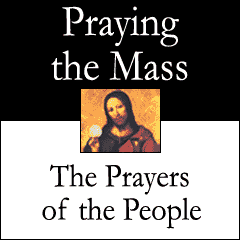 (Source: Michael Leunig, The Age)
(Source: Michael Leunig, The Age)
Well, I’m confused. I have two copies of The Age, one delivered yesterday and one delivered today, both proclaiming themselves to be the “Easter Edition, March 21-22, 2008”. The only thing to give them a firm distinguishing date is the weather report. Even the TV programmes are provided for Friday to Sunday in both editions.
Nevertheless, the result is twice the usual amount of secular and semi-religious reflection on the place of the Paschal Mystery in today’s society. You might find some of the following a good read.
Top of the list is Barney Zwartz’s “The Resurrection of Sin”. Yes, I know, shocking title, but I will put that down to Barney’s editors, because the article is actually worth reading–about the importance of at least some sort of understanding of “sin” in today’s society if we want to preserve any notion of personal moral responsibility. My favourite quotation from this article is:
Sin, after all, is the only doctrine of the ancient church that is empirically verifiable. And its passing has left another vital concept languishing, that of moral responsibility.
In a similar vein, John Armstrong argues for the rehabilitation of the idea of the soul in his article “Beyond the Sacred – Reinventing a vision of the Soul”.
The idea of the soul as something inalienable, as persisting and continuing even when completely ignored or denied, was important in Christianity because it allowed for the possibility of the forgiveness of sins and for death-bed repentance. But this is a crucial secular thought as well. It invites us to think of each person as always capable of a return to sane kindness, and as always in need of such a return.
Then there is the lengthy essay by Michael Leunig, Melbourne’s favourite cartoonist and resident prophet, “Away in a Chook Shed”. Unfortunately, this is not available on-line. It appears in the A2 Section of one of the twin editions of The Age. It is a whimsical (as always) but interesting reflection on the only only scripture verse his father knew by heart (actually, he used it as a sort of swear word): “Jesus Wept” John 11:35. Favourite quotation:
All this was made somehow bearable and simple by my father’s enchanging utterance, “Jesus wept”. I think my dad was unconsciously telling me this: “Son, ther’s a whole lot of things you’re going to hear about Jesus in your life that are supposed to bring you salvation, and go into all that if you want: that’s your affair; but at the end of the day, when push comes to shove, then there’s just one thing you need to know about him and it’s this: Jesus wept.”
He could be right in that.
And of course, there is always Catherine Deveny. Her column “Easter? Wake me when its over” (in the edition with yesterday’s weather report) is, as usual, calculated to offend. (She even admits as much in the first line of her column). However, I found it rather amusing. Her main point is that Easter hasn’t caught on culturally as well as Christmas, and for that we can all be grateful. Leaves us real Christians to get on with the business that really matters while the rest go camping over the long weekend (see Leunig’s cartoon above). Favourite quotation:
Despite Easter being the Big Kahuna of the Christian holy days, we’re all a bit lukewarm about it. No cards, no customs, no songs. Where’s Deck the Halls with Eggs from Kmart? How about We Wish You a Happy Easter? Or, “On the fourth day of Easter my true love gave to me: four chocolate bilbies, three elegant rabbits, two panatones and a Humpty full of Smarties?”
Yes, well. I think we can be thankful for that. (Foreign readers may wonder what chocalate bilbies are. You can go here to find out how some have attempted to “Australianise” Easter in the same way Rolf Harris attempted to inculturate Christmas with “Six White Boomers”…)
Other bits:
Editorial: “Faith may be less strong, but hope remains”
ANNOUNCEMENTS of the death of Christianity, and of religious belief generally, have become familiar enough in Western, pluralist societies. From time to time, some of them are reported in this newspaper. But each year at Easter, as at Christmas, attendances at church services usually rise just enough to remind those to whom evidence still matters that such announcements are greatly exaggerated.
And, for the sake of completeness, I will just mention Warwick McFadyen’s rambling piece that never quite comes to the point, although he seems to say it in the title of his article: “The Story still has the power to transfix”.
The upshot of all this journalistic reflection is that Easter continues to confront today’s society as a mystery requiring some sort of response, if for no other reason than the fact that we get a long weekend out of it.


.jpg)







